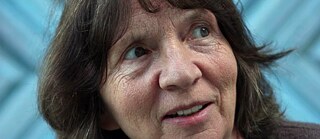Lezing
Aleida Assmann and Lars Ebert: Community Building – Political Challenges and Cultural Practices

Die Vieldeutigkeit der Welt
The lecture is part of the programme Die Vieldeutigkeit der Welt, a series jointly organised by H401, Goethe-Institut Niederlande and Genootschap Nederland-Duitsland.
What threatens it and what we can do for it.
The question of "social cohesion" is not new. But over the last decade it has moved to the top of the agenda of pressing problems. The division of society and the radicalisation of its climate have become the focus of our attention and are confirmed daily with new evidence. But media attention alone is not enough. In order to reduce the explosive division of society and strengthen the public spirit, a longer-term perspective, constructive ideas and, above all, sustainable strategies are needed. For it is not enough to talk only about division and hatred, we must also think about how to restore a sense of community – at all levels: globally, in the EU, at the national level, in the cities and in schools.
Aleida Assmann (1947) is a German professor of English and Literary Studies, who studied Egyptology and whose work has focused on cultural anthropology and Cultural and Communicative Memory.
In 2014, she received the Heineken Prize for history from the Royal Netherlands Academy of Arts and Sciences (KNAW). In 2017, she was awarded the Balzan Prize for Collective Memory together with her husband Jan Assmann. And in 2018, she was awarded for the prestigious Peace Prize for the German Bookstore (Friedenspreis des Deutschen Buchhandels) together with Jan Assmann, honouring their work "sustainable peace and understanding among the peoples of the world" and: "In view of the growing political instrumentalization of the latest German history, Aleida Assmann gives a lot of information about the culture's memory of a nation". The work of Assmann points out that an open and honest relationship with the past is the basic condition for peaceful coexistence.
Assmann's early works were about English literature and the history of literary communication. Since the 1990s her focus has been on cultural anthropology, especially Cultural and Communicative Memory, terms she and her husband coined and developed. Her specific interests is focused on the history of German memory since 1945, the role of generations in literature and society, and theories of memory.
Since 2011 she has been working on a research project titled The Past in the Present: Dimensions and Dynamics of Cultural Memory. This project summarizes in English her and Jan Assmann's work on cultural memory.
Aleida Assmann is a highly influential inter- and transdisciplinary thinker who coined the concept of "cultural memory" in the field of cultural studies, as well as in public debates. Her work had far-reaching impact presenting collective memory as a requirement for the formation of the identity of religious and political communities.
Aleida Assmann's work under the title of "cultural memory" shaped a new paradigm well beyond her own field and country. Along with her husband Jan Assmann she initiated the interdisciplinary working circle Archaeology of literary communication, which analyzed written traditions as the most important instrument of anthropological self-investigation. Her work demonstrates an extensive knowledge reaching well beyond the limits of her own specialism, a knowledge which in her painstakingly written and easily understandable texts surprises and illuminates the reader time after time.
Aleida Assman will be interviewed at the Goethe-Institut Amsterdam by Lars Ebert.
Lars Ebert (Heidelberg, 1976) is co-director of the cultural centre H401 in Amsterdam where he develops and implements European collaboration projects. He also works in the area of higher education and the arts as an independent advisor and frequent facilitator, moderator and speaker during international events. He is member of the Executive Committee of Culture Action Europe, the political voice of the cultural sector in Europe and chairs the board of EQ Arts, the first subject specific and trans-national quality assurance agency for the arts.
RSVP at productie@h401.org.
Details
Goethe-Institut Amsterdam
Herengracht 470
1017 CA Amsterdam
Taal: Engels
Prijs: gratis
+31 20 6235287 | +31 20 5312900 productie@h401.org